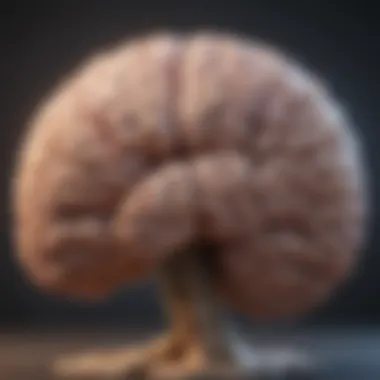Distinguishing Dementia from Alzheimer’s Disease


Intro
Understanding the distinction between dementia and Alzheimer’s is vital for both medical professionals and caregivers. Often, the two terms are confused, yet they refer to different conditions that impact cognitive function. Awareness of these differences can lead to better diagnostic practices and improve treatment plans, which is essential for enhancing the quality of life for affected individuals. This engagement will clarify definitions, symptoms, causes, treatment approaches, and the significance of this knowledge in the healthcare field.
Research Overview
Summary of Key Findings
Recent studies indicate that while all Alzheimer’s cases fall under the dementia umbrella, not all dementias are Alzheimer’s. The cognitive decline seen in dementia can arise from various causes, including vascular issues or other neurodegenerative diseases. Understanding these nuances helps in tailoring specific therapies and interventions.
Research Objectives and Hypotheses
The main objective of this exploration is to clarify how dementia and Alzheimer’s differ. This will include evaluating the definitions, symptoms, and underlying causes of each condition. The hypothesis is that by elucidating these differences, we can foster a better understanding of both conditions among healthcare providers, which might enhance patient care and research initiatives.
Methodology
Study Design and Approach
This investigation is structured as a comprehensive literature review. It evaluates existing research and findings from reputable sources, focusing on peer-reviewed articles, clinical studies, and established medical resources.
Data Collection Techniques
Data was collected through several methods, including:
- Literature Review: Analyzing peer-reviewed journals and articles.
- Expert Interviews: Engaging with healthcare professionals in neurology and geriatrics.
- Online Surveys: Gathering information from patients and caregivers about their experiences with dementia and Alzheimer’s.
Through this approach, the exploration aims to provide a well-rounded view, enriching the understanding of both conditions.
"Distinguishing between two complex cognitive conditions can influence care and research significantly."
This examination will further discuss symptoms, possible treatments, and contemporary research trends in the field.
Understanding Dementia
Understanding dementia is vital for both affected individuals and their caregivers. This condition encompasses a range of symptoms affecting cognitive function, impacting memory, thinking, and social abilities. Grasping the intricacies of dementia aids in developing effective support systems, fostering awareness, and improving the quality of life for those living with the condition.
Definition of Dementia
Dementia is an umbrella term used to describe a variety of symptoms characterized by a decline in cognitive function severe enough to interfere with daily life. It is not a specific disease but rather a syndrome that can result from various pathologies. The cognitive decline might impact various aspects, including memory, reasoning, focus, and communication.
Types of Dementia
- Alzheimer's Disease
Alzheimer's disease is the most common type of dementia, accounting for a significant portion of diagnosed cases. It primarily affects memory and cognitive functions, progressing gradually over time. A key characteristic is the presence of amyloid plaques and tau tangles in the brain, which contribute to its degenerative nature. Understanding its unique traits is essential for distinguishing it from other types. - Vascular Dementia
Vascular dementia occurs due to reduced blood flow to the brain, often resulting from strokes or other vascular issues. The primary aspect of vascular dementia is its association with cardiovascular health. Unlike Alzheimer's, which is more gradual, symptoms may appear suddenly following a stroke. Recognizing this type helps inform management approaches tailored to the individual's vascular health. - Frontotemporal Dementia
Frontotemporal dementia often impacts younger individuals and is characterized by changes in personality and behavior rather than memory loss in early stages. The unique feature of this type is the degeneration of the frontal and temporal lobes, resulting in social withdrawal or significant changes in behavior. Discussing frontotemporal dementia highlights the need for understanding unconventional symptoms that differ from more common types. - Mixed Dementia
Mixed dementia refers to a combination of dementia types, particularly Alzheimer's disease and vascular dementia. Its significance lies in its coexistence, which may lead to overlapping symptoms that complicate diagnosis and treatment. By recognizing its mixed nature, caregivers can adopt a more comprehensive approach in managing symptoms that might not fit classical presentations.
Symptoms of Dementia
- Cognitive Symptoms
Cognitive symptoms include memory loss, confusion, and difficulties with problem-solving. These are among the first indicators of dementia. Early identification of these symptoms is crucial for guiding treatment options and lifestyle adjustments. - Behavioral Symptoms
Behavioral symptoms may manifest as mood swings, agitation, or changes in social interactions. These symptoms can be distressing not only for individuals suffering from dementia but also for their families and caregivers. Understanding them facilitates better communication and coping strategies within the support network. - Emotional Symptoms
Emotional symptoms in dementia can include anxiety, depression, and a sense of loss. These aspects are sometimes overlooked but play a significant role in the overall well-being of individuals with dementia. Addressing emotional health through supportive counseling is important in any treatment plan. - Physical Symptoms
While dementia primarily affects cognitive capacities, it can also lead to physical symptoms such as difficulty with coordination or balance. Recognizing these signs is important, especially in preventing falls and promoting safety for those affected.
Diagnosis of Dementia
- Clinical Assessments
Clinical assessments are necessary first steps in diagnosing dementia. These may involve interviews, detailed medical histories, and exams to evaluate cognitive abilities. Timely and accurate assessments lead to earlier intervention, which can significantly affect quality of life. - Neuroimaging Techniques
Neuroimaging techniques like MRI and CT scans provide visual insights into brain activities and structure. These scans can show changes that are consistent with various types of dementia. Their use enhances the diagnostic process, enabling a more thorough understanding of brain health. - Cognitive Testing
Cognitive testing involves standardized assessments to measure memory, attention, language skills, and other cognitive functions. These tests complement clinical assessments and neuroimaging, providing a comprehensive view of cognitive health. The results can guide treatment decisions and inform caregivers about potential challenges ahead.
Understanding dementia in its entirety is crucial for demystifying the condition and fostering an environment conducive to support and care.
Examining Alzheimer’s Disease


Understanding Alzheimer’s Disease is pivotal in the broader context of dementia discussions. As a primary form of dementia, Alzheimer’s impacts millions globally. Knowing its specific characteristics offers insights into its diagnosis and treatment. The examination of Alzheimer’s includes exploring its definition, causes, symptoms, and progression stages. This knowledge is not just academic; it shapes how healthcare providers, caregivers, and families engage with affected individuals.
Definition of Alzheimer’s Disease
Alzheimer's Disease is a neurodegenerative disorder that primarily affects memory and cognitive function. It is the most common type of dementia, accounting for approximately 60 to 80 percent of dementia cases worldwide. This disease is marked by progressive memory loss and impacts daily life significantly, making it essential to understand for effective management.
Etiology of Alzheimer’s Disease
A nuanced understanding of Alzheimer’s etiology can guide prevention and treatment strategies.
Genetic Factors
Genetic Factors play a critical role in determining an individual's risk for developing Alzheimer’s. Specific genes, like the APOE-e4 allele, have been identified as significant risk factors. This genetic connection is beneficial for genetic counseling and risk evaluation in families. However, not everyone with these genes will develop the disease, indicating a complex interplay of genetics and environment.
Environmental Influences
Environmental Influences encompass lifestyle choices and exposures that may affect Alzheimer’s onset. Factors such as diet, exercise, and social engagement contribute significantly. These influences are popular topics for discussion as they underscore preventative strategies. Studies often highlight that a healthy lifestyle, including cardiovascular health, can mitigate risks. However, pinpointing exact environmental triggers remains challenging.
Biochemical Changes
Biochemical Changes within the brain, such as the accumulation of amyloid-beta plaques and tau tangles, are hallmarks of Alzheimer’s pathology. Understanding these changes aids in the research for therapeutic targets. These changes can serve as a ground for further investigation into drug development. While some biochemical markers can indicate the disease, they vary among individuals, which adds a layer of complexity.
Symptoms of Alzheimer’s Disease
Identifying symptoms early is crucial for managing Alzheimer’s effectively.
Memory Loss
Memory Loss is often the first noticeable symptom of Alzheimer’s. This loss typically affects recent memories, making it difficult for individuals to remember recent events or conversations. Recognizing this symptom early can prompt timely medical intervention, which may slow progression. Moreover, discussing memory loss can foster better understanding among caregivers.
Language Difficulties
Language Difficulties often manifest as trouble finding the right words or following conversations. This symptom can frustrate both the individual and their loved ones. Being aware of language challenges facilitates more effective communication strategies. Encouraging patience and using simple language can help in these interactions.
Disorientation
Disorientation may present as confusion about time, place, or individuals. This symptom can lead to distress and anxiety for the affected person. Recognizing disorientation helps caregivers create a more supportive environment. Providing visual cues or reminders can ease such confusion.
Changes in Mood
Changes in Mood are common and can be quite variable. Individuals may experience depression, anxiety, or frustration as they grapple with their symptoms. Understanding these emotional shifts is essential for providing appropriate support. Addressing mood changes can improve the quality of life for individuals living with Alzheimer’s.
Stages of Alzheimer’s Disease
Alzheimer’s progresses through identifiable stages, each characterized by specific challenges.
Mild Cognitive Impairment
Mild Cognitive Impairment represents a transitional phase before Alzheimer's becomes apparent. Individuals may struggle with memory or cognitive tasks, but retain independence. Recognizing this phase allows for early interventions that may sustain function longer. Recommendations for lifestyle changes during this stage can also delay progression.
Moderate Alzheimer’s Disease
Moderate Alzheimer’s Disease is marked by more pronounced memory deficits and increased assistance with daily tasks. Recognizing these signs is essential for monitoring care levels. Caregivers must adjust their approaches as individuals lose more autonomy, and structured routines can be beneficial.
Severe Alzheimer’s Disease


Severe Alzheimer’s Disease results in individuals becoming increasingly dependent on others for basic activities. Understanding this stage is crucial for creating supportive caregiving environments. At this point, communication becomes more challenging, requiring caregivers to adapt their interactions to ensure comfort and understanding.
Key Differences Between Dementia and Alzheimer’s
Understanding the key differences between dementia and Alzheimer’s is critical for several reasons. These two terms are often used interchangeably, leading to confusion among those affected and their families. Their distinctions impact diagnosis, treatment, and care strategies. Recognizing these differences can significantly enhance the quality of life for individuals experiencing these conditions. It also informs healthcare providers, educators, and researchers about the specific needs of this population, fostering tailored interventions.
Nature of the Conditions
Dementia is an umbrella term encompassing a range of symptoms that affect cognitive abilities, such as memory, thinking, and social skills. It is not a specific disease but rather a collection of symptoms resulting from various conditions affecting the brain. Alzheimer’s disease, however, is a specific degenerative brain disorder and the most common cause of dementia. Understanding that dementia is a syndrome, while Alzheimer’s is a disease, is crucial in medical discussions and patient care.
Causative Factors
The causative factors vary significantly between dementia and Alzheimer’s. Dementia can derive from multiple underlying issues, like vascular diseases, brain injury, or even nutritional deficiencies. Alzheimer's disease has certain genetic predispositions, like mutations in the APP, PSEN1, and PSEN2 genes. Environmental factors and lifestyle choices can also influence its occurrence. For example, high blood pressure and diabetes are known to elevate the risk of developing Alzheimer’s. A detailed comprehension of these factors can inform preventive strategies and treatment approaches.
Symptomatology
There is a distinct difference in symptomatology between dementia and Alzheimer’s. While both conditions share common symptoms, Alzheimer's disease has its own specific traits. Memory loss is the first and most recognizable symptom of Alzheimer’s. Individuals may struggle with recalling recent events while still remembering information from years ago. In contrast, dementia can present with a broader range of cognitive disruptions, including impaired reasoning and judgment. Behavioral changes in Alzheimer's can also manifest earlier than in other types of dementia. Therefore, diagnosing these conditions requires careful attention to symptom evolution and presentation.
Diagnosis Criteria
The diagnostic process for dementia and Alzheimer's varies. For dementia, healthcare professionals utilize a combination of clinical assessments, patient history, and neuroimaging techniques to identify cognitive decline caused by various factors. In Alzheimer’s, cognitive testing focuses specifically on memory and language skills, alongside imaging tests to observe brain changes typical in Alzheimer’s disease, such as amyloid plaques. A clear understanding of diagnostic criteria aids in differentiating between the two, leading to appropriate management and treatment strategies.
Differentiating between dementia and Alzheimer’s not only improves patient care but also enhances intervention strategies tailored to individual needs.
Treatment and Management Strategies
Understanding the treatment and management of dementia and Alzheimer’s is crucial. Proper strategies can enhance the quality of life for those affected and their caregivers. The approach involves both pharmacological and non-pharmacological methods. Each plays a significant role in addressing symptoms and improving overall well-being. In addition, early intervention is vital. It can slow down progression and allow individuals to maintain independence longer. Caregiver support is another essential element, providing necessary resources and emotional backing.
Therapeutic Approaches for Dementia
Pharmacological Treatments
Pharmacological treatments are designed to address symptoms directly related to dementia. Common medications include donepezil, rivastigmine, and galantamine. They work by improving neurotransmitter function, particularly acetylcholine. This is key because many people with dementia have reduced levels of this chemical in their brains. The main characteristic of these treatments is their capacity to temporarily alleviate cognitive symptoms. This can make them a popular choice in managing dementia.
However, the unique feature of pharmacological treatments is their limited effectiveness. They may not stop the disease from progressing. Some patients experience side effects which can vary from nausea to insomnia. Therefore, monitoring is essential when beginning any medication.
Non-Pharmacological Interventions
Non-pharmacological interventions focus on enhancing emotional and psychological well-being. These approaches can include cognitive stimulation therapy, art therapy, and physical exercise. The main characteristic of these interventions is their holistic nature. They cater not just to cognitive decline but also to the emotional and social needs of individuals. This is important in providing a well-rounded care plan for those with dementia.
One unique aspect of non-pharmacological interventions is their adaptability. They can easily be tailored to the individual's preferences and abilities. Moreover, they often carry fewer risks compared to medications, making them a beneficial option. Yet, they may require more time and commitment to realize significant benefits.
Therapeutic Approaches for Alzheimer’s
Cholinesterase Inhibitors
Cholinesterase inhibitors are a prominent class of drugs used in Alzheimer’s therapy. This includes medications like donepezil, tacrine, and rivastigmine. They work by slowing the breakdown of acetylcholine, thus enhancing communication between nerve cells. The primary benefit of cholinesterase inhibitors is their potential to manage symptoms related to cognition and memory. They are popular for individuals in mild to moderate stages of Alzheimer’s.
However, these medications do not alter the course of the disease significantly. Side effects like gastrointestinal upset or bradycardia may also arise. Careful consideration and management plans are necessary to ensure safety and efficacy.
NMDA Receptor Antagonists
NMDA receptor antagonists, such as memantine, provide another therapeutic option for Alzheimer’s patients. These drugs work by regulating the activity of glutamate, a neurotransmitter involved in learning and memory. Their distinct feature lies in their ability to protect brain cells against excessive stimulation. This protection may support cognitive function during moderate to severe stages of the disease.
The significant characteristic of these antagonists is their use alongside cholinesterase inhibitors. This dual approach can offer comprehensive management of symptoms. Nevertheless, NMDA receptor antagonists may have side effects, including dizziness or confusion. Diligent monitoring is vital.


Importance of Early Intervention
Early intervention in dementia and Alzheimer’s proves crucial for several reasons. Detecting symptoms early leads to timely diagnoses and treatment options. This can significantly slow progression and maintain autonomy. Furthermore, it allows individuals and families to plan for the future, including necessary lifestyle adjustments. A proactive approach often yields better overall outcomes for patients and caregivers alike.
Support Systems for Caregivers
Caregivers need substantial support while caring for individuals with dementia or Alzheimer’s. This support includes access to resources, education, and emotional encouragement. Support groups provide a platform for sharing experiences and coping strategies. They alleviate feelings of isolation. Moreover, respite care options are valuable, allowing caregivers short breaks to recharge. Investing in caregiver support is critical for the sustainability of caregiving, ensuring both the caregiver and patient manage their health effectively.
Effective treatment and management strategies can greatly enhance the quality of life for individuals with dementia and Alzheimer’s.
Ultimately, a multifaceted approach addressing both medical and psychosocial needs leads to more effective care.
Recent Research Developments
Research into dementia and Alzheimer’s disease is crucial for improving understanding and care for those affected by these conditions. Significant developments have recently emerged, enhancing the diagnosis, treatment, and overall management of cognitive decline. The relevance of this topic is underscored by ongoing efforts from researchers, clinicians, and advocates. New insights not only drive clinical advancements but also influence public policy and awareness initiatives.
Innovations in Alzheimer’s Research
Recent studies focus on identifying biological markers linked to Alzheimer’s disease, which can make an accurate diagnosis possible even in early stages. These innovations include the use of biomarkers in blood tests, enabling quicker and less invasive diagnosis. Another area of interest is the exploration of tau proteins and amyloid plaques that characterize Alzheimer’s. Research continues to refine our understanding of their roles and how they can be targeted with new therapies.
Moreover, researchers are focusing on lifestyle factors that may impact the onset or progression of Alzheimer’s. This includes studies on diet, exercise, and cognitive activities that seem to enhance brain health. Emerging evidence suggests a correlation between certain diets—like the Mediterranean diet—and reduced incidence of dementia. Further research can help establish more definitive connections between lifestyle and cognitive health, leading to preventive strategies for at-risk populations.
Interdisciplinary Approaches
Today’s challenges in dementia and Alzheimer’s research demand collaborations across multiple disciplines. Scientists combine insights from neurology, psychology, nutrition, and social work to develop comprehensive care models. For example, incorporating psychological support into treatment plans acknowledges the emotional and behavioral changes associated with these conditions.
Interdisciplinary research fosters innovation in care strategies, providing holistic support to caregivers and patients. By including diverse fields, researchers can identify more effective communication strategies between health professionals and families, improving coping mechanisms and overall quality of life for affected individuals.
Future Directions in Dementia Research
Future research in dementia looks promising with advances in genetics and neuroimaging. Researchers are investigating genetic links to both Alzheimer’s disease and other types of dementia. This research aims to identify individuals at risk before symptoms appear.
Additionally, neuroimaging technology is set to advance further, offering clearer insights into brain changes. Potentially, this can enhance our understanding of the progression of dementia and Alzheimer’s, paving the way for earlier intervention and tailored treatment plans.
Efforts to develop disease-modifying treatments are underway. Current medications often focus on symptoms, and in the future, researchers aim to create therapies that slow or stop disease progression. Active exploration of immunotherapy and other novel strategies could reshape the treatment landscape in the coming years.
Advocacy for Increased Awareness
Awareness initiatives play a crucial role in advancing research and supporting affected individuals. Advocacy groups work tirelessly to promote understanding about dementia and Alzheimer’s, connecting patients and caregivers to resources.
Increased awareness also facilitates funding for research. The public's understanding of the challenges presented by these conditions significantly influences policy decisions. Advocacy influences lawmakers to prioritize funding for clinical trials and research initiatives.
Furthermore, enhancing awareness can help dispel stigmas associated with cognitive decline and foster supportive communities for affected individuals. Improved understanding can lead to early diagnosis and better quality of care. It becomes critical for individuals, families, and the broader society to engage in conversations about dementia and Alzheimer’s disease.
"Increasing awareness about dementia and Alzheimer’s is not just the responsibility of professionals; everyone has a role in fostering understanding and support within their communities."
In summary, recent research developments in dementia and Alzheimer’s disease are critical for the future of care and treatment. Innovations in research, interdisciplinary approaches, potential for future directions and advocacy efforts all contribute to a more comprehensive understanding of these complex conditions.
Closure
In summary, understanding the distinctions between dementia and Alzheimer’s disease is essential for various reasons. Firstly, it influences how healthcare professionals approach diagnosis and treatment; different strategies are needed for each condition. This knowledge can also help caregivers and family members better support individuals affected by these disorders. It emphasizes the necessity for tailored interventions that accommodate the unique challenges each patient faces.
Moreover, raising awareness about these differences is crucial in advocating for resources and research funding. While both dementia and Alzheimer’s are significant concerns for an aging population, focusing on their specific characteristics can lead to improvements in care protocols and therapeutic practices.
Summary of Key Points
- Definitions: Dementia is an umbrella term for a range of cognitive impairments, while Alzheimer’s is a primary form of dementia.
- Symptoms: Alzheimer’s is typically marked by memory loss, whereas dementia may include broader cognitive decline.
- Causative Factors: Genetic, environmental, and biochemical factors influence Alzheimer’s, while dementia can arise from various other health conditions.
- Diagnostic Criteria: Distinct evaluation tools are applied for diagnosing each condition, highlighting the need for accurate identification.
Call to Action for Ongoing Research
The field of neurology is rapidly evolving, and ongoing research is vital. Encouraging researchers to continue exploring the complexities of dementia and Alzheimer’s can bring new insights into their treatment and management. It is imperative that all stakeholders—researchers, policymakers, and healthcare providers—collaborate to facilitate novel approaches.
Involvement in advocacy efforts, funding initiatives, and clinical trials is crucial. As we enhance our understanding of these conditions, we can improve therapeutic options and support frameworks for those affected. Every contribution counts in this endeavor toward better health outcomes.















